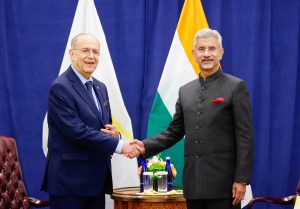Late last month, Hindus and Muslims took to the streets and clashed with each other over an India-Pakistan cricket match. As the riot snowballed, masked men gathered outside a Hindu temple and pelted it with bottles and crackers.
This sounds like a rather familiar run-of-the-mill incident of communal violence — except that it took place, not in India or Pakistan, but in the United Kingdom.
In the aftermath of the violence, India’s High Commission to the U.K. excoriated the “vandalization of premises and symbols of Hindu religion.” But that only served to prolong the fracas. Soon after that statement, the Muslim Council of Britain criticized India for taking a partisan view of the matter. “British Indian communities expect a balanced view from the Indian High Commission, which represents all of the diaspora, which can help heal divisions locally,” it said.
The U.K. wasn’t the only country whose relations with India were soured by a politically sensitive quarrel last month. In recent days and weeks, India’s domestic strife and strategic concerns have been spilling over into its foreign relations with heightened frequency.
In Canada, a so-called referendum over Khalistan — an independent state, long demanded by Sikh separatists — led to a pointedly phrased advisory from New Delhi to Indians traveling to Canada, cautioning against “a sharp increase in hate crimes and anti-India activities.” Reports later said that Canada had issued a tit-for-tat advisory against travel to the Indian states of Punjab and Gujarat. But although that turned out to be false, the problem threatens to hang around for a while, after rumors abounded that a second referendum was slated to be held in November.
A similar problem has affected India’s relations with Turkiye. In the aftermath of India’s decision in August 2019 to revoke Article 370 of the Indian constitution which guaranteed autonomy to Jammu and Kashmir, relations between Ankara and New Delhi went frosty. Turkish President Recep Tayyip Erdogan’s public criticism of India’s policies and crackdown in Kashmir evoked cycles of retaliation from New Delhi.
But as Turkiye now tries to reset its rivalries with Israel and the Gulf, India seemed to be next in line. On the sidelines of last month’s Shanghai Cooperation Organization (SCO) summit, Erdogan unexpectedly met with India’s Prime Minister Narendra Modi, trying to bury the hatchet for the first time in three years.
Yet, despite a cordial handshake, that effort appeared to fail. Shortly afterward, Erdogan rehashed his vociferous concerns over Kashmir at the U.N. General Assembly.
On its part, India reacted this time with more than just defensive words. In a meeting with his Turkish counterpart Mevlut Cavusoglu, Indian Foreign Minister Subrahmanyam Jaishankar dug up Turkiye’s bitter dispute in Cyprus, where it has long been lodged in a dangerous conflict with Greece.
Closer to home, Sri Lanka drew New Delhi’s wrath after it agreed to host a Chinese research vessel despite India’s protests.
That controversial decision appeared to rankle in domestic political discourse in India. In a speech last week, Mohan Bhagwat, the head of the powerful Hindu nationalist organization, the Rashtriya Swayamsevak Sangh (RSS), argued that “only India” has helped Colombo during its ongoing economic crisis, while “China, United States and Pakistan turned their attention to Sri Lanka when they saw business opportunities there.”
Visibly upset, New Delhi had earlier responded by hitting back with an unusually strong statement on Sri Lanka’s long-running ethnic conflict. At a recent meeting of the United Nations Human Rights Commission, India castigated Sri Lanka for “the lack of measurable progress on [its] commitments of a political solution to the ethnic issue” — a sea change from years of fence-sitting and mild nudges.
New Delhi’s rather fractious month in foreign relations is a marked shift from its age-old tradition of quiet and deft diplomacy, but that shift has long been in the making. As its domestic concerns spill over onto the international stage, India will increasingly make an effort to retaliate by speaking up on issues where it has traditionally been silent or understated — from Cyprus to Sri Lanka.
But far from being an indicator of a more proactive long-term involvement in those disputes, the timing of New Delhi’s statements seem to suggest that the Modi government is inclined only to use those issues as leverage in order to protect its own domestic political and security concerns.
































